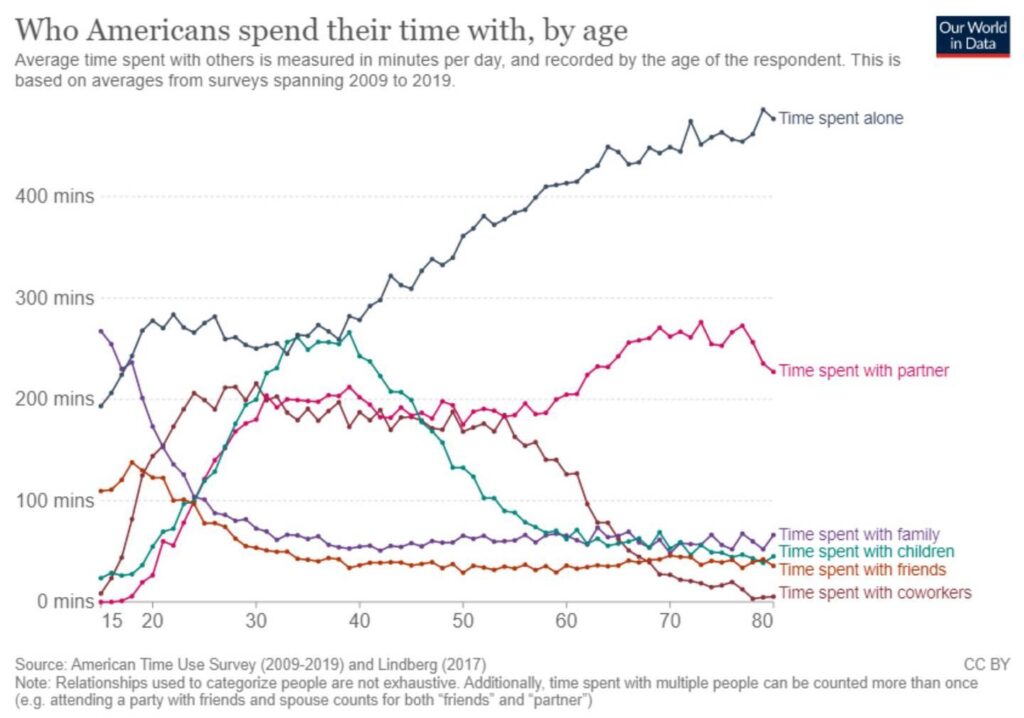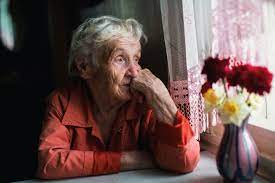Lack of social interaction is linked to increased risk of dementia, poorer physical health, lower psychological wellbeing and reduced cognitive functioning
Time alone can seem like an absolute luxury in the frantic days of early parenthood, when toddlers insist on overseeing even your bathroom visits. But be careful what you wish for.
A sharply rising line on a graph of how people, across the lifespan of 15-80 years old, spend their time, illustrates the increasing isolation that awaits us as we age. The data has been gathered from 10 years of the US Time Use Survey but there is no reason to think the broad picture would be radically different here.

Time spent with friends peaks in the late teens and decreases fairly rapidly through the career-building, family-forming decades of 20s to 40s. The retirement decades bring a substantial increase in time spent with a partner, and a temporary slight uplift in the company of friends. But with children raised and co-workers likely to be out of the picture, time alone overshadows the rest.
Lack of social interaction is linked to increased risk of dementia, poorer physical health, lower psychological wellbeing and reduced cognitive functioning. Even before the Covid-19 pandemic caused unprecedented social disconnection, loneliness was being flagged as a public health issue.
However, that’s not to say that time spent alone equates with loneliness. In taking a detailed look at the issue in research published in 2019, the Irish Longitudinal Study on Ageing (TIDLA) was able to distinguish between individuals who may not feel lonely despite a small social network and those who do within a larger social circle. But clearly, for many people, solitude and loneliness go hand in hand. Two-thirds of callers to Alone, for instance, live alone and loneliness is the highest area of need, says Grainne Loughran, senior policy and advocacy officer with the organisation that supports older people to age at home.
Nor is the experience of loneliness confined to older people. Loneliness is more obvious in ageing, says Dr Anne Kehoe, president-elect of the Irish Psychological Society, but she believes people can struggle to acknowledge it at other times in their lives. “If you look like you are very socially connected but feel very lonely, people tend to internalise that as if it’s their fault somehow, which is very hard to talk about. If you have a busy life with kids and work but feel very lonely, how do you talk about that because people wouldn’t necessarily believe it.”
The pandemic increased awareness of how loneliness can be anybody’s problems, regardless of age. The number of people who felt lonely all or most of the time doubled between April and November 2020, from 6.8 per cent to 13.7 per cent, according to figures from the Central Statistics Office. It was younger people, those aged 18-34, who were most likely to be affected by the change in circumstances, with one in four reporting feeling lonely all or most of the time.
“The pandemic helped dispel the myth that loneliness is an older person’s problem and challenged the stereotypical view of who can become lonely,” says Prof Roger O’Sullivan, director of Ageing Research and Development at the Institute of Public Health. “It also highlighted the value of our social and emotional connections to our overall wellbeing and identity.”
“Loneliness is dangerous for you; it’s been likened to smoking 15 cigarettes a day,” says Dr David Robinson, a consultant geriatrician at St James’s Hospital in Dublin. It is associated with depression and all the negative connotations of that condition, such as decreased physical and social activity, both of which increase your risk of dementia in later life.
He tells people that “as you age, your life contracts because you lose friends and acquire disability. You do need to push against it. So if your friends in your bridge club have all died, you need to go and make new friends somewhere else, if that’s your thing. That’s hard.” But taking such steps is the hallmark of adaptability in ageing, says Robinson, who set up the Republic’s first hospital-based social prescribing project at St James’s.
The true impact of socialisation on the brain is unclear, says Dr Paul McElwaine, a consultant geriatrician at Tallaght University Hospital (TUH) in Dublin. However, the recent Lancet Commission for dementia prevention highlighted social isolation as one of the modifiable risk factors that could be targeted.
“One study demonstrated that people who engaged in a positive social encounter tended to show better performance in cognitive testing on the same day and for the following two days. From a physiological point of view, one theory would suggest that isolation activates our stress response on a long-term basis, leading to changes to the brain, which impacts brain health.
“The reverse can also be hypothesised, that positive encounters lead to positive physiological changes which are beneficial to the brain,” adds McElwaine, host of an upcoming second series of TUH’s “Let’s Talk About” podcast, which will cover brain health, including the impact of social engagement.
Alone, which has staff and volunteers operating in every county, is still seeing the impact of the pandemic among the 60-plus age group. A lot of community and social activities for older people across the country haven’t been fully reinstated, says Loughran, due to many reasons, ranging from lack of funding to hesitancy among older people to re-engage. While loneliness increased for all ages, it has been harder for the older generation to bounce back into socialisation, she suggests, due to frailty and lack of confidence.
Before Covid-19 hit, Alone CEO Seán Moynihan and former senator, Keith Swanick, a Co Mayo GP, set up an all-Ireland loneliness taskforce in 2018. It’s a coalition of organisations advocating for policy changes to address loneliness at both a local and national level.
“I think loneliness can sometimes fall down the pecking order but it is a huge indicator of health, wellbeing, even lifespan,” says Loughran, who works with the taskforce. It is lobbying for a national strategy to combat loneliness, as promised in the Programme for Government, and the need for which has been compounded by the pandemic.
Earlier this year, O’Sullivan was a joint author, with Gerry Leavey from the Bamford Centre in Ulster University and Brian Lawlor from the Global Brain Health Institute in Trinity College Dublin, of an editorial in the British Medical Journal calling on governments to make tackling loneliness a priority. “A public health approach to loneliness means confronting the social and structural factors that influence risk of loneliness across the life course, including poverty, education, transport, inequalities, and housing,” they wrote.
Public awareness campaigns can help to address stigma and stereotypes but we also need to ensure that those most at risk of loneliness have adequate income and resources to help them engage and connect, O’Sullivan tells The Irish Times. “The rising cost of living may mean the social aspect of life will be sacrificed but the pandemic has shown that we need to value community involvement and opportunities to connect. As we begin the road to recovering from the pandemic, it is important to facilitate healthy social choices, making it easier to connect with others in the community, in work environments, valuing volunteering and increasing opportunities for building trust and social networks.”
In May this year, the Social Activity Measure designed by the ESRI found that the one-in-three people who reported being highly worried about the virus were less likely to have returned to their pre-pandemic levels of activity. It also reported that exercising and socialising less than before the pandemic was associated with low levels of wellbeing.
Knowing that increased isolation, with accompanying health risks, is the likely price of longer life expectancy, maybe individuals should be doing more, in midlife, to “future proof” their friendships. Staying in touch with friends we’ve met along life’s way and keeping up activities that offer opportunities to socialise would seem a prudent investment in better long-term health.
Kehoe agrees, pointing out that, unlike family, friends are voluntary. “People keep in touch because they want to keep in touch, not because they have to. It is extremely important to consider how you can do that when you have no time,” she says. “Friendships can become a casualty of family responsibilities and work. It feels like a want rather than a need but I would argue that it is a need.” You can “bumble on for five or 10 years” and not notice the loss of connection until something happens, such as a relationship breakdown or bereavement, and you really need those people.
Her advice is that it is never too late to reach out to people you were close to in the past. Even if you haven’t been in touch for 30 years, it’s highly unlikely you will be rejected. “Most people are delighted to be remembered.”
There are seasons in friendships when people are busier. “There’s no harm to be upfront about being busy,” she says because somebody who is less busy may not realise just how pressurised you are right now. “You can explain and say I really miss you.” Even if you’re short of time, there’s simple things you can do to stay connected, e.g., a text or card on an important date, and allow for flexibility in a friendship, Kehoe suggests. They might have forgotten your birthday but “keep up your side where you can”.
Spending time alone doesn’t have to be a bad thing. “It can be very positive but it is a lot about perception. If you are feeling lonely it is very hard to see that as positive.” If you are really missing connections, it’s important to assess what you need and take action, says Kehoe, “but very hard to do when you’re feeling negative and alone”.
As Loughran observes, people who looked forward to retirement can be surprised, when it comes, that they struggle to fill their days and the void of colleagues’ company. “If you’re not used to being in solitude, it takes a while to get used to it,” says Kehoe. “You have to come back and wonder what you want.”
Sometimes people like to garden, which is active but solitary, likewise to read or watch a film alone, “it depends on what will feed what you need from that time”.
Our interests change, what we do in life alters but there’s always scope for new friendships. “It takes time and we’re not great at being so open to that.” However, it’s never too late, she adds, to make new friends — they could not transform but extend your life.
Sheila Wayman
Tue August 16 2022
For more, click here.
